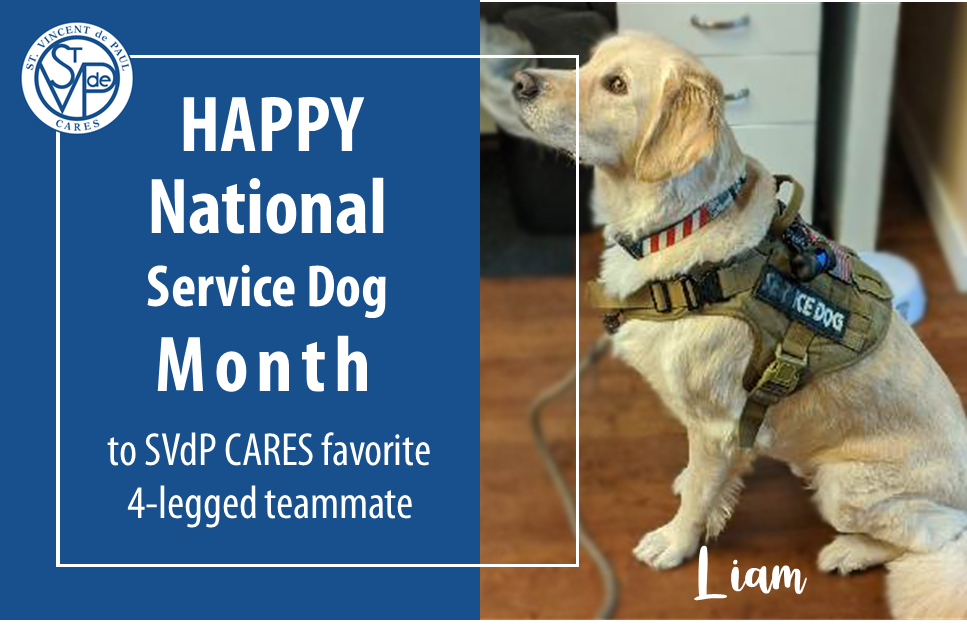September is National Service Dog Month, a time dedicated to raising awareness and showing appreciation for service dogs. This month, SVdP CARES recognizes a fellow four-legged team member, Liam, and the exemplary service he provides to his partner, Mike, who is responsible for providing support services to his caseload of 42 individuals escaping homelessness. Before his time here, he served our country as an EMT in the military.
Liam is a highly trained, incredibly smart (and adorable) member of the SVdP CARES team. The service he provides is invaluable to Mike, who provides services to those experiencing the effects of homelessness. SVdP CARES salutes Liam and all the working dogs who make millions of lives better and safer.
How does Liam support the work you do for SVdP CARES?
Liam is trained to provide support in a couple of ways. He is mainly trained for PTSD so he provides barriers in public or sits and watches behind me. He is also trained to not let me isolate or sit in one place for long periods of time. When it comes to work and being busy sitting isn’t really an option, so he doesn’t have much to do there. Liam’s best “work” function is making sure I stay engaged. If he senses me staring off or not moving enough, his training is to refocus me by licking. He will do it until he has my complete attention and then lets me get back to doing what I should be doing. He is also trained to make sure I keep an even mood. He lets me know I am off by not responding to commands or actions. Most times when this happens, he will usually just sit down or lay down in place until I notice and “reset.” Once I am back to “normal”, he goes on about his day like nothing happened.
What is a typical day for Liam?
A typical day for Liam starts around 5:30 am when he rolls over and watches me leave for the gym. When I get home he finally gets up and gets started around 7ish. He has breakfast and waits to get dressed for work. Liam’s day times are uneventful other than keeping an eye on me, food or sleeping. He doesn’t do much, or so it appears (he has never missed an alert in the 2+ years I have had him). When we are working, he doesn’t have to worry about most situations as we are out and about and usually busy. Evening/nights are when he does most of his work. Liam stays alert most of the night and is never more than a foot or two away, as sleeping is something I struggle with, which is why he probably sleeps most of the day.
What are things you would like others to know about service animals?
Most importantly they are dogs…they are highly trained dogs, but they are not perfect or robots that do everything perfectly. They have accidents, they like food, they like to play, and most importantly they have good and bad days–just like us. It takes time but there is a bond between service teams. That bond is crucial as it can be life-saving for a lot of teams as well. That bond/trust needs to be worked on daily, which is why it is so important that the service dog should be ignored (unless told otherwise) by everyone but their handler. Petting, playing, feeding, even talking to a service dog is a major distraction for both the handler and the animal. It can cause something minor such as not listening completely to their handler, to something major like missing an alert. For more information on service dog etiquette, click here.
Fun fact about Liam?
Liam spent the first 2 years of his life in a Tennessee prison. All the dogs from his organization are raised in the TDOC (Tennessee Department of Corrections) system, where inmates are selected and trained to train service dogs. The dogs are released on the weekend to volunteer families to be taken out and socialized and trained in public. They have trained numerous services dogs that are working throughout the United States.
